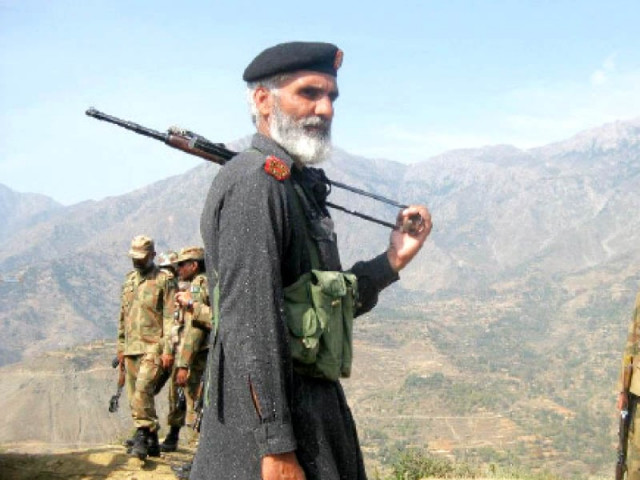The memory remains: A quartermaster’s full swing
With his second death anniversary having just passed, Fazl Rabi’s son recalls the valour of his father.

Much like the year before, Rabi’s second death anniversary passed by quietly. Family members gathered where Rabi breathed his last – Bazaar Khar Chowk – and lit a few candles. PHOTO: SHAHID ALI/INP
Shahid Ali was away, at university, when he learnt his father Subedar Quartermaster Fazl Rabi had died in a suicide attack in Khar Bazaar, Bajaur on May 4, 2012. “I had just met him in April when I returned home for a wedding.”
The blast ended up killing 29, including Rabi, Shahid told The Express Tribune in a telephone interview. At the time, the paper reported 25 casualties.
The Tehreek-e-Taliban Pakistan (TTP) had claimed responsibility for the attack. “He was involved in many operations against militants. Even without training, he was an important part of the Bajaur Levies’ bomb disposal unit (BDU).”
Rabi, the father, the warrior
“He was like my friend, we had a very open relationship.” Yet, as a soldier, as a warrior, Rabi was larger than life. He started his career in the levies in 1980, retired in 2005 and was rehired again on a contractual basis.
“People often used to ask my father how he managed to swing a second term of service, ‘How can you retire twice Rabi?’ they would ask,” recalled Shahid. “And Par Lala’s (a term of affection) response was always the same, ‘My love for the job was my greatest recommendation for the job.”
His love for the job was not a passive agent. Rabi was a determined member of the levies. “There would be IEDs, bombs but no one equipped to detonate them. My father would take it on himself to walk over to the device and neutralise it – without any training.”
Four days, five nights
On August 5, 2008, Rabi went in a convoy to Loi Sam area in Bajaur to escort a construction team. In those days, the area was a known haven for anti-state elements and eventually, Rabi and his fellow men were surrounded on all sides by militants.
The militants opened fire and the quartermaster and his comrades retaliated. The clash continued for four days, with the levies fast running out of ammunition, already sans food and water. “I found out later that towards the end of the fight, my father told his personal guard Muttabar Khan, ‘Save a bullet for me, if it comes to that, I would rather you shoot me than let me be taken by militants’.”
According to reports, no assistance came in from the government, the men were left to survive or die on their own. However, after five nights, they came out alive.
Eventually, Rabi was presented with a Tamgha-e-Shujaat by the president on March 23, 2010.
His valour did not go unnoticed by the Taliban either. There were over a dozen attacks on his life, shared the son. “He never told us but the Taliban sent a shroud to his office – the message? Get ready to die.”
Rabi’s second death anniversary passed by quietly, much like the first. Shahid, his immediate family and a few relatives gathered at the spot where Rabi breathed his last – Bazaar Khar Chowk and lit a few candles. “His fellow servicemen did not attend, nor did the political agent. My last vivid memory of my father was the last Eid. Do you know he even worked on Eid or other important occasions? Because we were friends, I could say things to him without hesitation,” said Shahid quietly. “So I asked him, ‘Why don’t you stay with your family on such days?’ and all he said was ‘Duty first’.”
Those you leave behind
Rabi gave his life to the services, but not without the encouragement of his wife of several decades. “My mother always supported him. She would tell him, ‘Do the job with honour and you will be rewarded one day’.”
But Rabi’s wife never recovered from losing her partner of 40 years. “She cannot be left alone,” Shahid said.
Shahid has an elder brother, Fazl Haji, who works for the civil administration, a job his father helped him with. Their younger brother is a student of grade seven and their younger sister stays at home, having left school in grade four. Their fifth sibling, a sister, is married.
After completing his master’s degree in Urdu literature, Shahid is now prepping for his Central Superior Services (CSS) exam. And all his hopes are riding on this test as he feels his father’s other family – the government he served – abandoned the grieving children and mother.
Invisible heroes
When he died, Rabi’s family received monetary compensation of Rs300,000 and nothing more. While the rest of the martyrs in the Khar Bazaar tragedy received larger packages and their children permanent jobs, Shahid, his four siblings and mother were not helped further. The reason given was that the quartermaster was a contract soldier.
“We spoke to former governor Shaukatullah who was from the same area, to the political agent, to the governor before Shaukatullah, but all we got were unfulfilled promises.”
After losing Par Lala, the next big shock was how unappreciated he was after his death, grieved Shahid.
“We have just one complaint, one request – don’t leave your heroes unappreciated. Don’t forget your heroes.”
Published in The Express Tribune, May 16th, 2014.













COMMENTS
Comments are moderated and generally will be posted if they are on-topic and not abusive.
For more information, please see our Comments FAQ